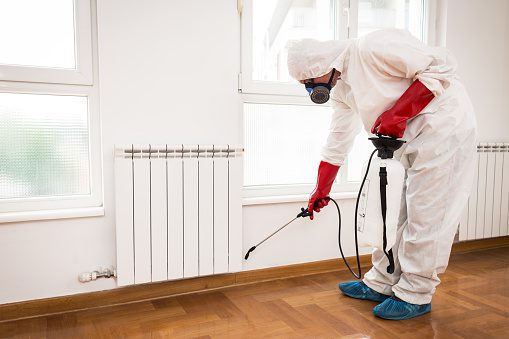
| Pest Control Technician Key Stats | |
|---|---|
| Avg. Salary / year | $37,130 |
| Avg. Pay / hour | $17.85 |
| Education | 0-6 Months |
| Job Outlook | 7% |
An insect or pest infestation is not only a nuisance in people’s lives; it can also be a health hazard for those who have to live under these circumstances.
Pest Control Technicians help promote a safer environment for their clients by eliminating insect or pest problems.
Pest Control Technicians eliminate pest infestations from a wide a range of places such as private homes, apartment buildings, schools and businesses.
They remove all sorts of pests including cockroaches, termites, mice, ants, spiders or bedbugs.
Their work involves driving to client homes with special equipment, pesticides and fumigation appliances.
Individuals who want to become a Pest Control Technician must learn how to use proper safety protocol in order to protect their health.
The use of pesticides is very common in this field and only with proper training will an individual be able to eliminate pests and protect their health.
Table of Contents
Education Requirements to Become a Pest Control Technician
The minimum requirement in order to become a Pest Control Technician is a high school diploma.
In addition, candidates need to secure a state licensure.
In order to become a Pest Control Technician an employer may hire a high school graduate and provide training on the job as a technician.
A candidate can also complete an apprenticeship and learn while working for lower wages.
Under apprenticeships, a candidate will learn everything they need to know about being a Pest Control Technician.
An employer may have several types of training for Pest Control Technicians and may require candidates to attend classroom workshops, on the job training and study on their own for the licensure exam.
After completing the training requirements, a candidate can work under the supervision of a licensed Pest Control Technician while they prepare for licensure.
Only licensed professionals are able to work unsupervised.
In addition, candidates can choose a specialty in which to work in and can receive this kind of training through their employer as well.
Some specialties in pest control include:
- General Pest Control
- Rodent Control
- Fumigation
- Termite Control
- Ornamental and Turf Control
Candidates can also learn safety precautions and pesticide use from their employers in order to work in the field.
A typical training that focuses on general pest control and includes safety classes typically takes an average of three months to complete.
Continuing classes may also be necessary depending on the employer and state requirements.
This is necessary due to the frequent advancements in pesticide use and methods.
Pest Control Technician Job Description
Pest Control Technicians use extermination techniques to eliminate several types of pest problems.
They are constantly on the move visiting client’s homes or businesses to perform exterminations and may work either outdoors or indoors during the elimination process.
When a client calls a pest controlling business, the exact infestation problem may not be fully realized until a Pest Control Technician arrives where the pests are taking hold.
It is when a Pest Control Technician arrives to the client’s specified location that they may realize the full extent of the problem.
Using their knowledge, they will gauge the infestation problem and evaluate the situation.
They will then use the best method to rid the place of pests.
They then decide whether chemicals, fumigation, traps or a combination of applications in order to get rid of the infestation problem.
One method Pest Control Technicians can use in order to rid a space of pests is by using an integrated pest management technique.
Specialists can block off any means of entry from an indoor facility so the pests are unable to enter the building.
Pest Control Technician Salary and Career Path
The national median wage for Pest Control Technicians is approximately $14 per hour.
The salary range for this profession begins at about $9.50 per hour and ends at an hourly rate of approximately $21 per hour.
Pest Control Technicians should expect a growth of about 15% through the year 2018.
This is considered a fast growth when compared to other professions and industries.
This expected growth is attributed in part to population increase, consumer’s interest in hiring a professional to perform this kind of work instead of doing it themselves.
Another factor in this profession’s growth has to do with less candidates looking for this type of work and finding other types of careers.
![]() The below information is based on the 2021 BLS national averages.
The below information is based on the 2021 BLS national averages.
National Average Salary
$40,640Average Salary by State
| State | Avg. Annual Salary |
|---|---|
| Alabama | $37,130 |
| Arizona | $43,780 |
| Arkansas | $36,300 |
| California | $43,850 |
| Colorado | $45,660 |
| Connecticut | $43,250 |
| Delaware | $41,680 |
| District of Columbia | $48,840 |
| Florida | $38,680 |
| Georgia | $38,440 |
| Hawaii | $43,130 |
| Idaho | $31,120 |
| Illinois | $38,960 |
| Indiana | $38,260 |
| Iowa | $38,910 |
| Kansas | $39,090 |
| Kentucky | $34,700 |
| Louisiana | $36,190 |
| Maine | $47,010 |
| Maryland | $39,930 |
| Massachusetts | $49,830 |
| Michigan | $42,300 |
| Minnesota | $52,330 |
| Mississippi | $42,310 |
| Missouri | $40,720 |
| Montana | $50,590 |
| Nebraska | $40,530 |
| Nevada | $45,290 |
| New Hampshire | $46,380 |
| New Jersey | $43,920 |
| New Mexico | $36,930 |
| New York | $42,850 |
| North Carolina | $36,920 |
| North Dakota | $36,050 |
| Ohio | $46,850 |
| Oklahoma | $36,120 |
| Oregon | $41,910 |
| Pennsylvania | $38,800 |
| Rhode Island | $40,340 |
| South Carolina | $35,380 |
| South Dakota | $44,400 |
| Tennessee | $36,730 |
| Texas | $39,350 |
| Utah | $40,030 |
| Vermont | $42,140 |
| Virginia | $41,360 |
| Washington | $53,240 |
| West Virginia | $35,820 |
| Wisconsin | $41,620 |
| Wyoming | $38,550 |
| Guam | $27,170 |
| Puerto Rico | $25,760 |
The top earning state in the field is Washington, where the average salary is $53,240.
These are the top 5 earning states in the field:
* Employment conditions in your area may vary.
Frequently Asked Questions
What does a pest control technician do?
Pest control technicians inspect buildings to identify the presence of unwanted pests and design control strategies to control and remove roaches, rats, bedbugs, ants, ticks and termites from buildings and surrounding areas.
Pests can pose serious health and safety risks to the building’s occupants.
Pest control workers control and remove these creatures from homes, businesses, apartment buildings, help protect inhabitants and maintain the integrity of these buildings.
A pest control technician’s job duties vary by state.
Pest control technicians work directly with customers and they need good customer and communication skills.
In order to avoid contamination and to preserve public safety, pest control technicians must follow very strict sanitation and safety procedures when using pesticides.
Workers who use pesticides must possess a state license.
Pest control technicians need customer-service skills, physical stamina and attention to detail.
They must keep detailed records of the chemicals they use and the payment they receive.
How much does a pest control technician make?
According to the Bureau of Labor Statistics, the median annual wage for pest control workers was $35,610 as of May 2018.
Salaries vary based on many factors and a pest control technician can make anywhere between less than $25,000 and more than $55,000 a year.
How much does it cost to become a pest control technician?
Most pest control workers have a high school diploma and receive on-the-job training.
All states require pest control workers to be licensed and many companies require employees to have good driving records.
Pest control technicians usually receive training after being hired and they must complete classes in pesticide use and safety in order to get a state license.
Workers are also required to complete continuing education classes to keep up with new pest control methods.
What is the demand for pest control technicians?
According to the Bureau of Labor Statistics, the demand for pest control technicians is projected to grow 7 percent from 2018 to 2028.
As the number of invasive species grows the demand for pest control workers is expected to grow.
However, this growth will be tempered by the fact that many people prefer to control pests themselves rather than pay for professional services.
Job prospects are expected to be good, especially for experienced pest control technicians.
How long does it take to become a pest control technician?
Pest control technicians typically need a high school diploma and learn through on-the-job training provided by their employer.
However, you will need a state license in order to be allowed to work with pesticides.
To get that license you will need to complete 3 months of pesticide safety and use and you must also pass a licensing exam.
Because pest control methods change, workers who are employed in this field need to complete continuing education classes in order to keep us with scientific advances in this field.













